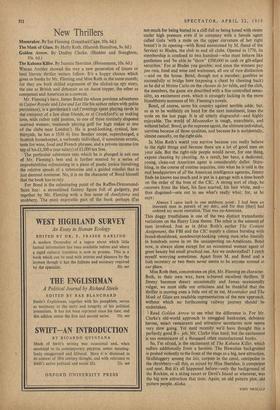Moonraker. By Ian Fleming. (Jonathan Cape, 10s. 6d.)
The Kahuna Killer. By Juanita Sheridan. (Heinemann, 10s. 6d.) WHERE Ambler showed the way a new generation of (more or less) literate thriller writers follow. It's a happy chance which gives us books by Mr. Fleming and Miss Roth in the same month; for they are both skilled exponents of the slicked-up spy story, the one as British and debonair as an Ascot topper, the other as competent and American as a crewcut.
Mr. Fleming's hero, James Bond (to whose previous adventures in Casino Royale and Live and Let Die his author refers with polite persistence), is a gentleman's cad ('evenings spent playing cards in the company of a few close friends, or at Crockford's; or making love, with rather cold passion, to one of three similarly disposed married women; weekends playing golf for high stakes at one of the clubs near London'). He is good-looking, cynical, late- thirtyish; he has a 1930 41 litre Bentley coupC supercharged, a Scottish housekeeper, a verbosely individual, if sometimes erratic, taste for wine, food and French phrases, and a private income (on top of his £1,500 a year salary) of £1,000 tax free.
The particular adventure into which he is plunged is not one of Mr. Fleming's best and is further marred by a series of improbabilities culminating in a piece of poetic justice (involving the relative speeds of a submarine and a guided missile) that is just damned nonsense. No, it is on the character of Bond himself that the book has to rely.
not much for being buried in a cliff-fall or being hosed with steam under high pressure even if in company with a female agent called Gala 'with a mole on the upper curvature of her right breast') is its opening--with Bond summoned by M. (head of the Service) to Blades, the club to end all clubs. Opened in 1776, its membership is confined to two hundred—who must behave like
gentlemen and 'be able to "show" £100,000 in cash or gilt-edged securities.' For at Blades you gamble; and since the winners pay pro rata, food and wine and waitresses, all are of rare distinction —and on the house. Bond, though not a member, gambles as successfully at bridge here (exposing a cheat by cheating back) as he did at Monte Carlo on the chemin de fer table, and the club, the members, the game are described with a fine controlled sensu- ality, an excitement even, which is strangely lacking in the more bloodthirsty moments of Mr. Fleming's novels.
Bond, of course, saves his country against terrible odds; but, so as to be wolfishly on hand for the next instalment, loses the mole on the last page. It is all utterly disgraceful—and highly enjoyable. The world of Moonraker is tough, anarchistic, and without belief; Bond, as the supreme egoist, the ultimate individual, survives because of those qualities, and because he is accidentally, almost casually, on the right side.
In Miss Roth's world you survive because you really believe in the right things and because there are a lot of good men on your side. But the right-side people would never, for one thing, expose cheating by cheating. As a result, her hero, a dedicated, young, clean-cut American agent is considerably duller. Stum- bling, in the course of routine inquiries, into what he is told is the real headquarters of all the American intelligence agencies, Jimmy
finds he knows too much and is put in a garage with a time-bomb on the order of the boss of the CIC. A strong sort of chap, he .recovers from the blast, his face scarred, his hair white, and—
thus disguised—sets out to see what's really what; for, as he says :
Always I came back to one stubborn point: I had been an innocent man in pursuit of my duty, and for that [they] had ordered my secret execution. That was un-American.
This doggy trustfulness is one of the two distinct transatlantic variations on the Harry Lime theme. The other is the amount of men involved. Just as in \Miss Roth's earlier The Content Assignment, the FBI and the CIC supply a climax bursting with
broad-shouldered, nondescript-looking young men who literally in hundreds move in on the unsuspecting un-Americans. Bond now, is always alone except for an occasional woman agent of great beauty but small practical use. Are we understaffed? I catch myself worrying sometimes. Apart from M. and Bond and a lush secretary or two there never seems to be anyone around at our place.
Miss Roth then, concentrates on plot, Mr. Fleming on character.
Both, in their own way, have achieved excellent thrillers. If Jimmy becomes dreary occasionally and James occasionally vulgar, we must stifle our criticisms and be thankful that the thriller is moving even a little out of its rut. Moonraker and The Mask of Glass are readable representatives of the new approach, without which no forthcoming railway journey should be undertaken.
Read Golden Arrow to see what the difference is. For Mr.
Clarke's old-world approach to smuggled banknotes, debonair heroes, smart restaurants and attractive secretaries now seems










































 Previous page
Previous page